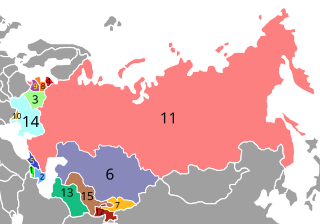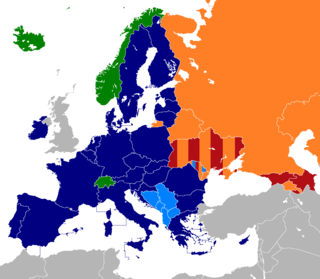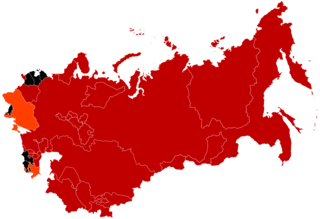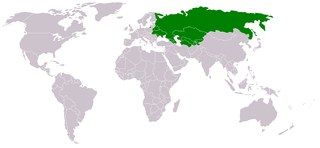
The Commonwealth of Independent States (CIS) is a regional intergovernmental organization in Eurasia. It was formed following the dissolution of the Soviet Union in 1991. It covers an area of 20,368,759 km2 (7,864,422 sq mi) and has an estimated population of 239,796,010. The CIS encourages cooperation in economic, political, and military affairs and has certain powers relating to the coordination of trade, finance, lawmaking, and security, including cross-border crime prevention.

The Eurasian Economic Community was a regional organisation between 2000 and 2014 which aimed for the economic integration of its member states. The organisation originated from the Commonwealth of Independent States (CIS) on 29 March 1996, with the treaty on the establishment of the Eurasian Economic Community signed on 10 October 2000 in Kazakhstan's capital Astana by Presidents Alexander Lukashenko of Belarus, Nursultan Nazarbayev of Kazakhstan, Askar Akayev of Kyrgyzstan, Vladimir Putin of Russia, and Emomali Rahmon of Tajikistan. Uzbekistan joined the community on 7 October 2005, but later withdrew on 16 October 2008.

The post-Soviet states, also referred to as the former Soviet Union (FSU) or the former Soviet republics, are the independent sovereign states that emerged/re-emerged from the dissolution of the Soviet Union in 1991. Prior to their independence, they existed as Union Republics, which were the top-level constituents of the Soviet Union. There are 15 post-Soviet states in total: Armenia, Azerbaijan, Belarus, Estonia, Georgia, Kazakhstan, Kyrgyzstan, Latvia, Lithuania, Moldova, Russia, Tajikistan, Turkmenistan, Ukraine, and Uzbekistan. Each of these countries succeeded their respective Union Republics: the Armenian SSR, the Azerbaijan SSR, the Byelorussian SSR, the Estonian SSR, the Georgian SSR, the Kazakh SSR, the Kirghiz SSR, the Latvian SSR, the Lithuanian SSR, the Moldavian SSR, the Russian SFSR, the Tajik SSR, the Turkmen SSR, the Ukrainian SSR, and the Uzbek SSR. In Russia, the term "near abroad" is sometimes used to refer to the post-Soviet states other than Russia.

At present, there are six multi-lateral free trade areas in Europe, and one former free trade area in recent history. Note that there are also a number of bilateral free trade agreements between states and between trade blocks; and that some states participate in more than one free trade area.

The Commonwealth of Independent States Cup is a defunct annual regional association football tournament, recognized by FIFA.

The Commonwealth of Independent States national football team was a transitional national team of the Football Federation of the Soviet Union in 1992. It was accepted that the team would represent the Commonwealth of Independent States that was formed as a loose union of former union republics.
The Soviet Union men's national tennis team competed in 1962–1991. The team competed with the name 'Commonwealth of Independent States' in 1992. Following 1992, the nations competed as:

The Central Asian Union (CAU), later called the Central Asian Economic Union, was an intergovernmental organization for economic integration between the Central Asian post-Soviet republics of Kazakhstan, Kyrgyzstan and Uzbekistan between 1994 and 2004. Tajikistan joined the Union in 1996 as an observer. Several proposals to restore the Union have been put forward since its dissolution.

The New Union Treaty was a draft treaty that would have replaced the 1922 Treaty on the Creation of the Union of Soviet Socialist Republics (USSR) to salvage and reform the USSR. A ceremony of the Russian SFSR signing the treaty was scheduled for 20 August 1991 but was prevented by the August Coup a day earlier.
The USSR national rugby union team represented the Soviet Union in rugby union until the early 1990s.

Commonwealth of Independent States Free Trade Area (CISFTA) is a free-trade area among Russia, Ukraine, Belarus, Uzbekistan, Moldova, Armenia, Kyrgyzstan, Kazakhstan and Tajikistan. Five CISFTA participants, all except Ukraine, Uzbekistan, Moldova and Tajikistan, are members of the Eurasian Economic Union, comprising a single economic market, although Uzbekistan and Moldova are observers.

The Alma-Ata Protocols were the founding declarations and principles of the Commonwealth of Independent States (CIS). The leaders of Russia, Ukraine, and Belarus had agreed to the Belovezha Accords on 8 December 1991, declaring the Soviet Union dissolved and forming the CIS. On 21 December 1991, Armenia, Azerbaijan, Belarus, Kazakhstan, Kyrgyzstan, Moldova, Russia, Tajikistan, Turkmenistan, Ukraine, and Uzbekistan agreed to the Alma-Ata Protocols, formally establishing the CIS. The latter agreement included the original three Belavezha signatories, as well as eight additional former Soviet republics. Georgia was the only former republic that did not participate while Lithuania, Latvia and Estonia refused to do so as according to their governments, the Baltic states were illegally incorporated into the USSR in 1940.

The Eurasian Economic Union is an economic union of five post-Soviet states located in Eurasia. The EAEU has an integrated single market. As of 2023, it consists of 183 million people and a gross domestic product of over $2.4 trillion.
Kazakhstan is a nation that has competed at two Hopman Cup tournaments and first competed in the 22nd Hopman Cup in 2010. Its best result to date is finishing second in their group in 2010.
The Soviet Union is a nation that competed at two consecutive Hopman Cup tournaments and first competed in the 2nd Hopman Cup in 1990. The Soviet Union never won a tie and as such never passed the quarterfinal stage of the tournament.
Uzbekistan is a nation that has competed at the Hopman Cup tournament on one occasion, in 2003. In 2003, Uzbekistan won their qualification play-off but went on to place fourth in group A.
Ukraine is a nation that has competed at the Hopman Cup tournament on four occasions, the first being in 1993. In 1995 and 2016, Ukraine were the tournament runners-up and this remains their best showing to date. Before its dissolution, Ukraine used to form part of the Soviet Union which also competed at the Hopman Cup on two occasions in the early 1990s. Additionally, Ukraine is a member of the CIS which entered a CIS team into the 1992 event.
Russia is a nation that has competed at the Hopman Cup tournament on seven occasions, their first appearance coming at the 13th annual staging of the event in 2001. They have won the tournament on one occasion, in 2007, and were the runners up two years later in 2009.

The Agreement on the Establishment of a Free Trade Area is an international agreement on the intention to create a free trade regime in goods signed by 12 post-Soviet states on 15 April 1994, at a meeting of the Commonwealth of Independent States (CIS) Council of Heads of State in Moscow and entered into force on December 30, 1994. Article 1 indicated that this was "the first stage of the creation of the Economic Union", but on 2 April 1999 the countries agreed to remove this phrase from the agreement. Article 17 also confirmed the intention to conclude a free trade agreement in services.

Eurasian economic integration is the process of economic integration of post-Soviet states which are geographically located in the center of the continent of Eurasia. Eurasian integration has been taking shape since 1991, originally via the establishment of the Commonwealth of Independent States in 1991, as noted in the World Trade Organization report. Currently, integration is primarily implemented through organizations that are open to accession by any post-Soviet countries, such as the Commonwealth of Independent States and the Eurasian Economic Union. An economic union means the deepest stage of economic integration.











